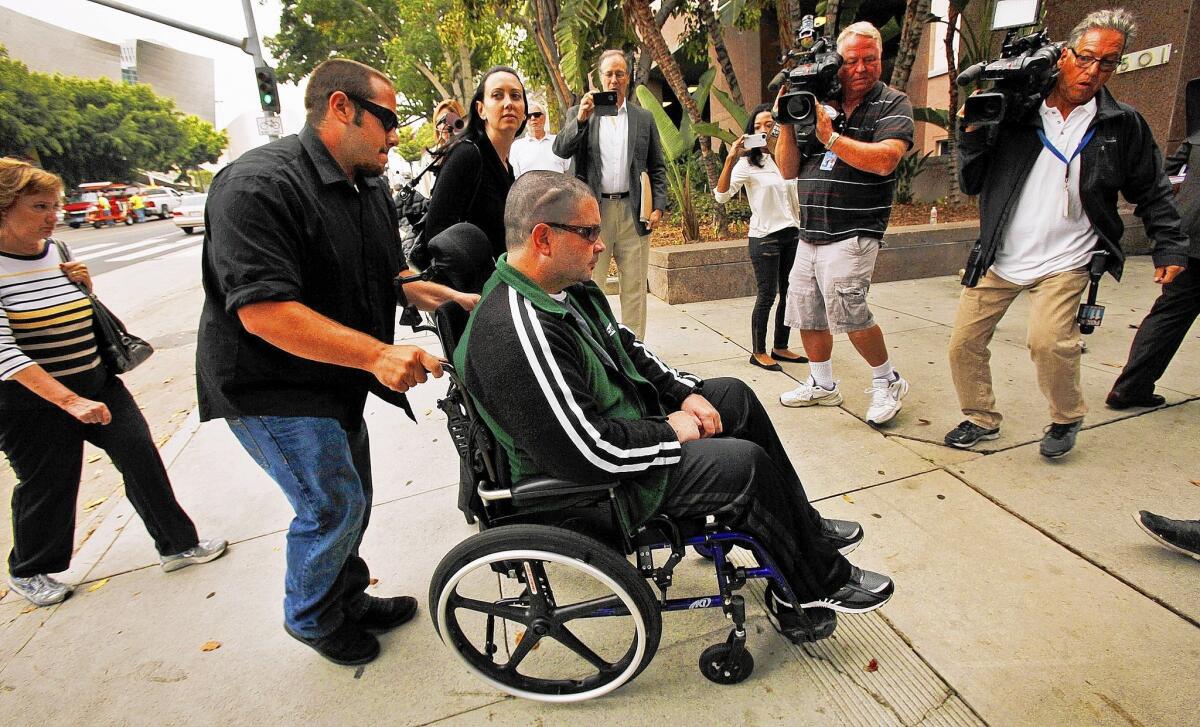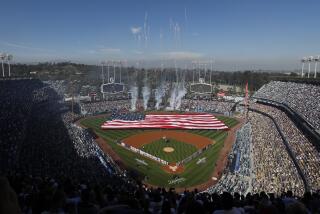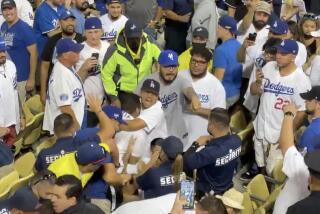Jury begins deliberating in Bryan Stow civil trial

- Share via
What happened to Bryan Stow at Dodger Stadium on Opening Day in March 2011, leaving him with lifelong injuries, was either a crime of heated passion that was over in a matter of seconds or a preventable security lapse hours in the making.
Lawyers for Stow, the Santa Cruz paramedic and San Francisco Giants fan who was attacked in the stadium parking lot, and the Dodgers argued Thursday over who should foot the bill for the costly medical care Stow will need for years to come and compensation for his pain and suffering.
Team lawyer Dana Fox said the blame was on Louie Sanchez and Marvin Norwood, the two men who admitted criminal responsibility and are serving time for the assault on Stow, 45. No level of security can prevent all crime from occurring, he argued, and it’s the two men that Stow and his family should be suing.
“Take them out of the picture and we’re not here,” he said. “You can speculate all day long about if the Dodgers had done something different.”
Thomas Girardi, who brought the negligence lawsuit on behalf of Stow and his two children, said it was clearly the Dodgers who should shoulder 100% of the blame. He said Sanchez had been causing trouble in the stadium starting in the second inning and should have been kicked out of the game hours earlier. It was the Dodgers’ scrimping on security for their bottom line that led to Stow’s beating, he told jurors.
“The Dodgers’ own pocketbook prevented them from providing proper security,” he said, pointing out that the team’s security budget amounted to about 62 cents per each fan in attendance.
The two security personnel who were assigned to work in the parking lot where Stow was attacked had not managed to get to their posts when the attack took place, he said.
“They could’ve stopped it. They didn’t do diddly squat,” he said. “It didn’t happen in a second — it happened for two and a half hours in the game, and four assaults in Lot 2.”
Girardi argued that when the Dodgers decided to cut the number of uniformed police officers, who are paid a higher hourly rate than those dressed in polo shirts, it was putting their budget concerns ahead of the safety and security of game attendees. The shift came at a time when the team was concerned about a gang problem at the stadium, and beer sales were “off the charts,” Girardi told jurors.
He accused the team of trying to redirect blame toward others, including the Los Angeles Police Department and California Highway Patrol, which had officers at or near the stadium.
“It’s the ABPD defense: anybody but the poor Dodgers,” Girardi said.
Fox countered that the team had increased its security budget over the years and had spent more on security on that Opening Day than it ever had. He said the plaintiffs were misleading jurors by not offering any context about how the 62-cents-a-fan figure compares to the industry average.
“You cannot say we can prevent an altercation, a fight that begins and ends in 10 seconds,” he said. “A fight that’s fueled, by, yes, testosterone and anger and alcohol.”
Fox said it would be “heartless” not to feel for Stow and his family, but told jurors that they needed to set aside their sympathy in judging the case. He asked jurors to consider Stow’s responsibility, noting that his blood alcohol level was nearly twice the legal limit for driving, and that a witness testified that he saw Stow raising his arms and yelling something in the direction of Sanchez and Norwood.
“One hundred percent, that defies common sense,” he said. “There were things that Mr. Stow did that put these events into action. Don’t get yourself this drunk and then say, I share no responsibility for what happened.”
Jurors began deliberating on the case shortly before noon Thursday. They will decide whether the Dodgers and former owner Frank McCourt were negligent, and if so, how the liability is to be apportioned between the parties involved. If they find the team and McCourt liable, they will also decide on a dollar amount to be awarded to Stow and his children.
Stow’s attorneys are asking for about $50 million in damages, estimating that his medical costs will exceed $30 million and arguing that the team should be levied punitive damages for its negligence. The team’s lawyers contend that his medical costs will be between $6.5 million and $11 million.
More to Read
Sign up for Essential California
The most important California stories and recommendations in your inbox every morning.
You may occasionally receive promotional content from the Los Angeles Times.










